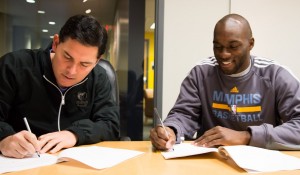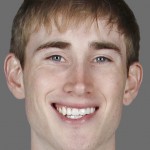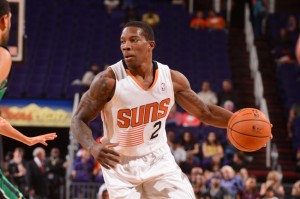Quincy Pondexter, Memphis Grizzlies
 Pondexter (and his trusty sidekick Buckets) is the team’s future at small forward, regardless of how well Tayshaun Prince performs this season. To lock him up for four years and $14 million is a really shrewd move by Memphis management, especially with players like Marc Gasol, Zach Randolph and Mike Conley taking up so much of the team’s long-term cap room.
Pondexter (and his trusty sidekick Buckets) is the team’s future at small forward, regardless of how well Tayshaun Prince performs this season. To lock him up for four years and $14 million is a really shrewd move by Memphis management, especially with players like Marc Gasol, Zach Randolph and Mike Conley taking up so much of the team’s long-term cap room.
In just 23.8 minutes per game in the postseason, Pondexter averaged nearly nine points on 48.9 percent shooting and 45.3 percent from the arc. In last season’s conference finals against the Spurs, Pondexter did even better than that, scoring 15.3 points on 53.7 percent shooting (48 percent from three). Against those same Spurs in the season opener, Pondexter had 13 points and three assists. Assuming those numbers get back to his playoff level, Memphis struck a big-time bargain.
The Extended Waiters
Greg Monroe, Detroit Pistons
An argument could be made that Monroe is actually expendable to the Pistons. Josh Smith is really a power forward currently masquerading as a small forward. Andre Drummond is an emerging force and can truly play center. Monroe saw his minutes per game increase from 31.5 to 33.2 but his season-to-season numbers got unquestionably worse, even more so than Cousins.
| Monroe | FG % | Pts | Reb | Blk | PER | O Rtg | D Rtg | WS | WS/48 |
| 2011-2012 | 52.1 | 15.4 | 9.7 | 0.7 | 22 | 110 | 102 | 7 | 0.161 |
| 2012-2013 | 48.6 | 16 | 9.6 | 0.7 | 19.5 | 104 | 105 | 5.9 | 0.105 |
Monroe’s field-goal percentage and offensive rating decreased significantly. His per 48 win share total got a good deal worse as well. Monroe may very well be a 16-and-nine guy his whole career. And that’s very good, without question. But will Detroit pay him as the player he is, or will someone else pay him for what they think he could be?
You would think that Phoenix – after trading for Bledsoe – would want him locked up long-term as one of the franchise’s foundational pieces. Perhaps the brain trust didn’t want to lock up an unproven entity. The downside is that Bledsoe could be gone for nothing this summer. A lot of teams wanted him last season.
Bledsoe doesn’t have much experience as a starter, but his per-36 minute numbers from last season are impressive: 14.9 points, 5.4 assists and 5.2 rebounds on 44.5 percent shooting and 39.7 percent from three with a really strong 17.5 PER.
In a dozen starts last season with the Clippers, Bledsoe averaged 14.2 points, 5.3 assists and 4.8 boards in 34.1 minutes. His field goal percentage went down to 40.5 percent overall, but he shot 43.8 percent from three.
Bledsoe will have this season to prove to Phoenix – and the rest of the NBA – that he is worth a big ticket contract.
Evan Turner, Philadelphia 76ers
The second overall pick in 2010 will have every opportunity to succeed for the tanking rebuilding 76ers this season. He had a phenomenal season debut in Philly’s upset of Miami, but his track record – and the long-term plan of GM Sam Hinkie – made it an easy decision for Philadelphia to not give him a contract extension.
| Turner Advanced | PER | TS % | EFG% | O Rtg | D Rtg | O WS | D WS | WS | WS/48 |
| 2011-2012 | 12.6 | 47.8 | 45.5 | 93 | 99 | -0.6 | 3 | 2.4 | 0.068 |
| 2012-2013 | 12.1 | 47.8 | 44.6 | 95 | 106 | -0.7 | 2.9 | 2.1 | 0.035 |
Those numbers are totally abysmal and unacceptable for any top-five pick, especially one making $6.68 million this season. Turner will be looking for another team next summer unless he has a huge resurgence.
Avery Bradley, Boston Celtics
Avery Bradley is a really good defensive player. Is he a starting point guard? Probably not. Is he even an NBA starter? Based on last season, definitely not. Look at how his stats plummeted last season:
| Bradley | FG % | 3FG % | Pts | Ast | Stl | PER | O Rtg | D Rtg | WS | WS/48 |
| 2011-2012 | 49.8 | 40.7 | 7.6 | 1.4 | 0.7 | 11.3 | 100 | 102 | 2.4 | 0.085 |
| 2012-2013 | 40.2 | 31.7 | 9.2 | 2.1 | 1.3 | 8.8 | 90 | 105 | 0.4 | 0.012 |
Bradley will have every opportunity to succeed as the starter for the Celtics with Rajon Rondo out as he plays for his NBA future.
Greivis Vasquez, Sacramento Kings
Pop quiz: Guess who led the NBA in total assists last season? That’s right, Greivis Vasquez, who has emerged as a very capable passer and 3-point shooter, as we can see below.
| Vasquez | FG % | 3FG % | Pts | Ast | Reb | PER | O Rtg | D Rtg | WS | WS/48 |
| 2011-2012 | 43 | 31.9 | 8.9 | 5.4 | 2.6 | 14.2 | 101 | 107 | 2.3 | 0.064 |
| 2012-2013 | 43.3 | 34.2 | 13.9 | 9 | 4.3 | 16.3 | 105 | 112 | 3.8 | 0.067 |
Vasquez’s main flaw is his really poor defense, which saw him allow 112 points per 100 possessions. Perhaps that’s what drove him out of New Orleans (the arrival of Jrue Holiday also contributed, and it could be what’s keeping him from getting a big contract from the Kings or another team.
Gordon Hayward, Utah Jazz
 Utah tried its hardest to work a four-year contract extension with Hayward, but the sides were too far apart to reach an agreement by the deadline. The Jazz brass (a very musical group, I’d assume) said it did not want Hayward’s contract situation to be a distraction, but here we are in November, and it’s a distraction.
Utah tried its hardest to work a four-year contract extension with Hayward, but the sides were too far apart to reach an agreement by the deadline. The Jazz brass (a very musical group, I’d assume) said it did not want Hayward’s contract situation to be a distraction, but here we are in November, and it’s a distraction.
Hayward is a logical piece in Utah’s rebuilding plan, along with Favors, Enes Kanter and Trey Burke. Hayward took and hit more threes last season, converting on 41.5 percent of his triple tries, to go with a career-high 14.1 points. He had 12 points, five assists and three steals in a season-opening loss to Oklahoma City, and Utah will be in an interesting position. The team obviously wants him to improve and progress. But if he does too much, then he could price himself out of town.
Shlomo Sprung loves advanced statistics and the way they explain what happens on the court. He is also the web editor of the Brooklyn Daily Eagle. A 2011 graduate of Columbia University’s Journalism School, he has previously worked for the New York Knicks, The Sporting News, Business Insider and other publications. His website is SprungOnSports.com. You should follow him on Twitter.
